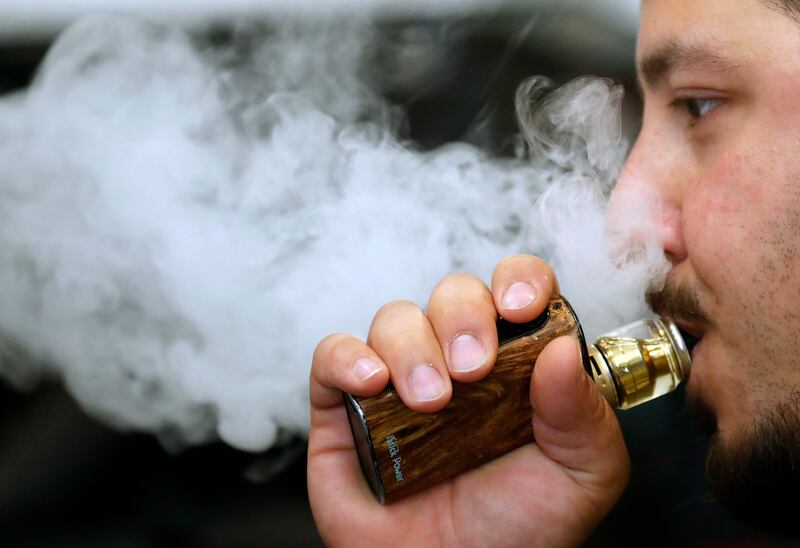SALT LAKE CITY — A ruling from a Utah judge will allow certain vape shops to continue selling flavored e-cigarettes for the next few weeks after the judge determined that state regulators who sought to restrict the sales failed to link them to a rise in cases of lung illness.
Third District Judge Keith Kelly on Monday issued a temporary restraining order that puts on hold part of an emergency rule from the Utah Department of Health until Nov. 22.
He is expected to decide before then whether to extend the order for the long term.
The ruling comes on the heels of a Friday report from the Centers for Disease Control and Prevention, which found Utah’s rate of lung injury is six times the national average, with an elevated rate of Utahns vaping the marijuana compound THC and a lower rate of nicotine. The findings “might reflect a distinct pattern of illicit THC supply and production in Utah or the western United States compared with that in the Midwest and other areas of the United States,” the report states.
As of Monday, the health department said it has recorded 109 cases of vaping-related lung injuries in the Beehive State since mid-April, including one death. More than 3 in 4 of those who fell ill were hospitalized.
The health department early this month filed the administrative rule aimed at stemming cases of vaping-related illness mostly tied to the THC cartridges. Though the exact causes of the illnesses remain unknown, state epidemiologists warn against vaping THC, saying the cartridges are likely the driver of the outbreak. They have reported finding the cutting agent vitamin E acetate in many of the devices.
A group of Utah vape retailers sued the health department last week to overturn the rule, which sought to restrict the sale of flavored e-cigarette products to retail tobacco specialty businesses. They argued there is no evidence of a connection between the lung injuries and flavored nicotine, and that they were denied due process because they had no opportunity to comment on the rule.
Kelly noted in his Monday order that a health department analysis and other documents supporting the rule contain “the lack of any justification for limiting the sale of legal flavored vape products.”
The judge found the health department failed to justify skipping a 120-day comment period, which is required by law except in cases where the four-month wait would “cause imminent peril” to the public.
Utah health officials contend moving the flavored items to specialty shops — where a person must be at least 19 or with a parent to enter — could eventually reduce the number of users who eventually vape THC. But they did not explain how the normal four-month comment process would pose a danger, Kelly said.
By contrast, the retailers say they will suffer “irreparable harm” if they can’t sell the flavors, the judge noted.
“It would have meant, in my case personally, bankruptcy,” said Juan Bravo, the owner of VIP Vapors in Orem. Bravo, also the president of the Utah Vapor Business Association, is among the plaintiffs who contend the flavored nicotine products are a draw for customers who also buy other items in their stores. They say the rule would give specialty shops a distinct advantage.
The judge allowed other portions of the rule to take effect, including a requirement for stores to post notices warning consumers about potential lung injuries related to electronic cigarette use.
Attorneys for the health department declined comment Monday. In a statement, the agency said it is disappointed in the judge’s order and will continue its efforts to protect the public.
“Our top priority is stopping the outbreak of vaping-associated lung injuries, and we believe the emergency rule is one of the tools that can help us achieve that goal,” the statement reads. It goes on to say most tobacco businesses are already complying with the rule and the shops who are fighting it in court represent a small minority.
In Utah, the median age of those with a confirmed vaping-related illness is 26 and most are male. A person inhaled THC in 89% of the cases and nicotine in 60%. Many vaped both substances.
Buying and using THC for recreational purposes remains illegal in Utah. The health department reports most of those who vaped THC and became ill reported getting the product from a friend, followed by an online or in-person dealer.


